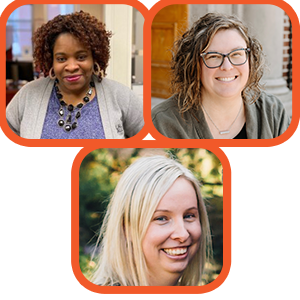
Editor’s note
June 14, 2022
The thing we never talk about in career development
June 14, 2022Practitioners can help students leverage their resilience and cultural capital in career planning
Candace Stewart-Smith, Jessie Eulenberg and Kathleen Clarke

Viewing these factors with deficit-based thinking is limiting. Instead, international students and career practitioners need to be reminded of students’ strengths that are also present when they transition to a new country, culture and language. Students can build on this resilience to support their career planning and goal setting.
Using frameworks and theories that are strengths-based can capture students’ assets, which can be used to navigate their career challenges. Constructivist theories and social justice frameworks can provide career practitioners with helpful tools to empower international students to position their journey and harness the knowledge they already possess to ease them into the workforce. Examples of such theories that you may wish to review are:
- The Systems Theory Framework, which encourages practitioners to ask curious questions and use storytelling as a tool in eliciting information.
- Yosso’s Model of Community Cultural Wealth, based on critical race theory, considers the positive aspects of cultural capital possessed by marginalized groups.
- Culture-Infused Career Counselling, which inspires us to take a social justice approach to improve how we work with others whose cultures are different from ours.
With aspects of these frameworks in mind, we propose four strategies that career practitioners can use to encourage a strengths-based career development approach with international students. With each of these recommendations, we provide examples of open-ended questions that could spark conversation with international students.
1. Help students by eliciting their unique stories and abilities
In meetings with international students, they often share that they lack the experience, language or confidence needed to compete in the Canadian job market. International students’ lived experiences often include many assets – a global worldview, family capital, cultural knowledge, intercultural skills and additional languages. By bringing an intentional focus to Yosso’s identified areas of cultural capital (e.g. aspirational, social and resistant capitals), career practitioners can empower and motivate students.
Students should be encouraged to build an inventory of stories that confidently express their specific abilities and capacity. Encouraging the telling of stories is grounded in Systems Theory Framework and is useful to frame students’ career goals and action steps.
By guiding students toward seeing the unique value in their lived experiences, career practitioners can help international students with the development of self-efficacy. Career practitioners can enhance students’ awareness of the strengths they possess and their ability to set goals by asking curious questions to elicit their stories. Examples of questions that can be used to elicit these stories are:
- Can you tell me about your decision and process for coming to Canada?
- Can you tell me about a time when you overcame a challenge while travelling or as an international student?
- Can you tell me how your international experience has changed you?
2. Use commonalities to develop supports for students with similar goals
At a fundamental level, one major distinction in international students’ intentions after graduation is whether to work in Canada or return to their country of origin. Some students may pursue a third option such as further international study or travel. We recommend asking students to identify their goals and intentions, so that this information can be used to inform career advice and the goal-setting process. With this information, career practitioners can offer programming to meet the distinct needs of different international students.
For group programming, effective planning at a cohort level should address the common needs of the group. For example, how to gain relevant experience or how to acquire post-graduation work permits and permanent residency options. In individual meetings, effective counselling includes listening to the student’s goals and knowledge of their home country to determine an action plan.
Career practitioners can understand students’ needs by asking curious questions in individual and group sessions such as:
- What are your intentions after graduation?
- What should I know about your future plans?
Read more
Helping before hiring: Rethinking employers’ post-secondary recruitment strategies
Navigating a world without resumes
Canada’s essential yet overqualified immigrant workforce
3. Be prepared to be a cultural coach
International students arriving in Canada are experts in their country of origin but may be new to Canadian cultural norms. Students need to understand the expectations of their host culture, and one of these norms is that in Canada, experience matters. Many domestic students are required to complete volunteer hours to graduate high school and may also elect to work part-time. International students may not have the experience of working or volunteering during high school if it is not customary in their home country.
A key cultural message to relay to international students intending to work in Canada after graduation is to get experience while they are still a student. As career practitioners, we can guide students through the Canadian job search process to explain the demand for skills and experience as well as help them strategize how to gain valuable, progressive experience.
In guiding international students to navigate experience requirements, here are some curious questions to ask:
- How was volunteer and work experience valued during your high school education?
- What work and volunteer experiences would you enjoy? How can I help you find these experiences?
- Do you feel prepared to succeed in the Canadian work environment? If not, in what ways do you feel unprepared?
4. Be prepared to reflect, learn and advocate
Career practitioners are continuous learners. The model of Culture-Infused Career Counselling affirms that in addition to learning about students’ cultures and strengths, it is important for practitioners to reflect on culture and upbringing.
“In moving to Canada, international students demonstrate a strong set of personal strengths and potential to succeed in their goals.”
Begin with reflecting on personal worldviews, as well as ideas about careers and values. Consider power and privilege relationships with students using an activity such as the power flower [download].
To enhance personal intercultural competencies further, research opportunities that are offered by local institutions or community organizations. The Canadian Bureau for International Education (CBIE) and Canadian Association of College & University Student Services (CACUSS) are rich sources of professional development in these competencies.
For our final set of curious questions, we encourage you to turn inward and ask yourself:
- What biases do I have?
- What is my social location (factors including gender, social class, race, education, ability, age, sexual orientation, religion, culture and geographic location) and privilege as a career practitioner and how does that influence my work with international students?
- What injustice do I see within employment practices? What can I do about these observations?
In moving to Canada, international students demonstrate a strong set of personal strengths and potential to succeed in their goals. The strengths emerging from their stories can be useful in various stages of their career development and goal setting. For example, they could be molded into behavioural-based interview examples that confidently answer: “Tell me about a time you overcame a challenge.”
Answering these curious questions will allow international students to recognize their strengths, build their resilience and move toward their transition to the workplace with a hopeful mindset.
Candace Stewart-Smith, MSc, is an International Student Academic Transition Advisor and MEd student at Wilfrid Laurier University. As a former international student, she is passionate about seeing international students thrive in the Canadian workforce.
Jessie Eulenberg, MSW, is a career consultant at Wilfrid Laurier University who enjoys connecting students with career development resources and opportunities. She collaborates with Laurier International to develop innovative programming for the growing international student population.
Kathleen Clarke, PhD, is an Assistant Professor at Wilfrid Laurier University. The focus of her research is understanding the challenges that specific populations of post-secondary students experience and how they can be further supported.

